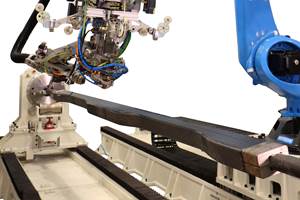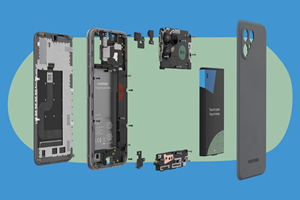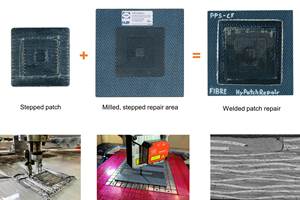Arevo launches direct-to-customer 3D-printed bicycle
The Superstrata brand features a fully unibody carbon fiber/polyamide frame manufactured using Arevo’s direct deposition additive manufacturing process.
Share
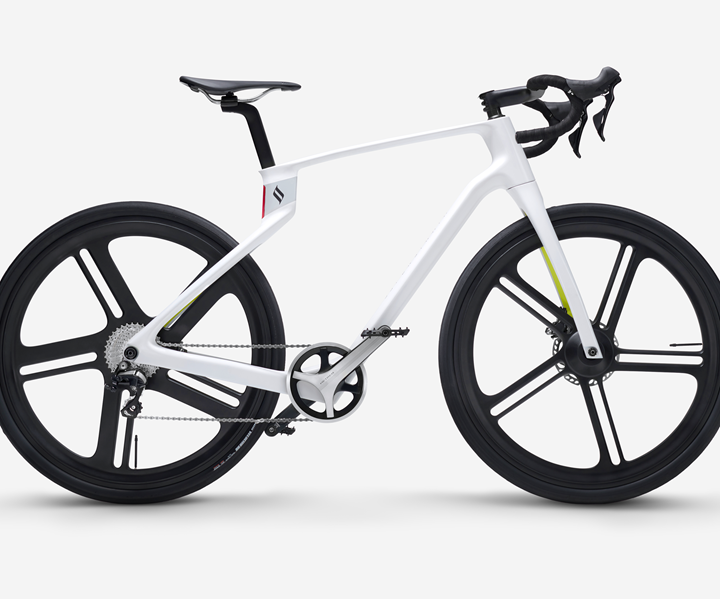
Source | Superstrata
Additive manufacturing specialist Arevo (Milpitas, Calif., U.S.) announced on July 13 that it is launching Superstrata, a direct-to-consumer Silicon Valley-based bicycle brand, said to be the world’s first made-to-measure, 3D-printed bicycle with an impact-resistant unibody carbon fiber frame.
The Superstrata bicycle — offered in the Terra “classic” unpowered model or as the Ion e-bike — features a true unibody frame construction, 3D-printed in a single pass of continuous carbon fiber/polyamide composite using Arevo’s direct energy deposition (DED) additive manufacturing technology. Further, the use of Arevo’s technology allows the Superstrata to be customized to the customer’s riding style, height, leg length, arm length and riding stiffness preference.
Sonny Vu, who became CEO of Arevo in January 2020, says the Superstrata launch signals the company’s strategic commitment to parts manufacture, in addition to equipment and technology sales. Also, he notes that although the Superstrata is a business-to-consumer (B2C) product, ultimately he wants to position the company as a business-to-business (B2B) parts supplier, with facilities in multiple countries. “We are pursuing a multi-location B2B model,” Vu says, “leveraging a B2C product to start.”
Vu says the Superstrata’s frame and fork will be manufactured in Vietnam at a facility Arevo is standing up in the next few months. At that facility, Arevo will install 12 of its robotic DED systems, which will deposit a polyamide resin with continuous carbon fiber (AS4) supplied by Hexcel (Stamford, Conn., U.S.) to build the bicycle structures.
Vu says the DED technology Arevo has developed allows deposition rates up to 100 millimeters per second with porosity of <1.0% in the finished part. Moreover, the use of polyamide, says Vu, based on in-house testing, makes the Superstrata uncommonly durable and highly impact-resistant. The frame of the Superstrata Terra weighs 1.3 kilograms; the frame of the Superstrata Ion weighs 1.6 kilograms.
“This bike was designed to leverage all the benefits of this new manufacturing technology to get the best of both worlds: strength and lightness,” says Bill Stephens, an award- winning bicycle designer and the creative force behind Superstrata.
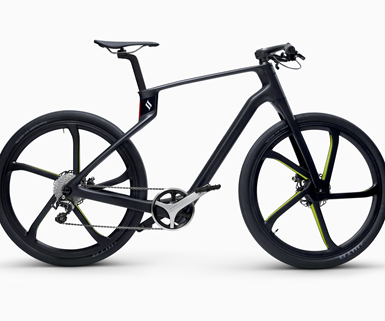
Source | Superstrata
Vu says Arevo expects, eventually, to operate 120 DED systems in the Vietnam facility, with new units featuring faster laydown speeds. Currently, he says, a single DED system can manufacture two bike frames per day, with next-generation machines expected to increase that to six frames per day. “Laydown speed, porosity and cost of capital are already well aligned,” Vu says. “We are working hard to increase the speed to get the cost of capital down further. We want this to be not just sustainable, but fast-growing.”
The combination of DED manufacturing technology with a polyamide resin matrix helps to make the Superstrata uncommonly affordable in the carbon fiber bike market. A Superstrata Terra with traditional metal-spoked wheels retails for $2,799; a Superstrata Ion with metal-spoked wheels retails for $3,999. Upgrading both versions to a carbon fiber wheel (also made via DED) increases prices to $4,798 and $5,998 respectively.
The Ion e-bike can be fully charged in two hours and has a range of 60 miles per charge. Both Terra and Ion will feature integrated data and power wiring throughout the frame, enabling a variety of electronic upgrades. Additional options include different riding styles (racing, street, gravel, touring), wheel type (metal or carbon fiber) and colorways (light or dark).
“My Olympic race bikes were light, but would crack when pushed too hard or crashed. Having a bike that’s light like other carbon fiber bikes but really tough is a dream come true,” says Sky Christopherson, two-time former Olympian cyclist and world record holder for the velodrome sprint.
Superstrata is taking orders now and will begin delivery in December 2020.
Related Content
Welding is not bonding
Discussion of the issues in our understanding of thermoplastic composite welded structures and certification of the latest materials and welding technologies for future airframes.
Read MoreMFFD thermoplastic floor beams — OOA consolidation for next-gen TPC aerostructures
GKN Fokker and Mikrosam develop AFP for the Multifunctional Fuselage Demonstrator’s floor beams and OOA consolidation of 6-meter spars for TPC rudders, elevators and tails.
Read MoreComposites end markets: Electronics (2024)
Increasingly, prototype and production-ready smart devices featuring thermoplastic composite cases and other components provide lightweight, optimized sustainable alternatives to metal.
Read MoreDeveloping repairs for thermoplastic composite aerostructures
HyPatchRepair project proves feasibility of automated process chain for welded thermoplastic composite patch repairs.
Read MoreRead Next
All-recycled, needle-punched nonwoven CFRP slashes carbon footprint of Formula 2 seat
Dallara and Tenowo collaborate to produce a race-ready Formula 2 seat using recycled carbon fiber, reducing CO2 emissions by 97.5% compared to virgin materials.
Read MorePlant tour: Daher Shap’in TechCenter and composites production plant, Saint-Aignan-de-Grandlieu, France
Co-located R&D and production advance OOA thermosets, thermoplastics, welding, recycling and digital technologies for faster processing and certification of lighter, more sustainable composites.
Read MoreVIDEO: High-volume processing for fiberglass components
Cannon Ergos, a company specializing in high-ton presses and equipment for composites fabrication and plastics processing, displayed automotive and industrial components at CAMX 2024.
Read More




















